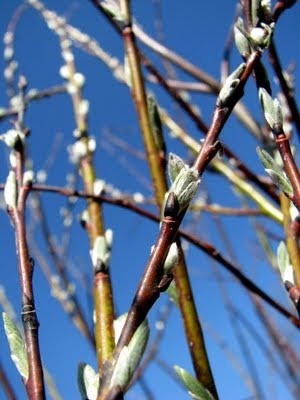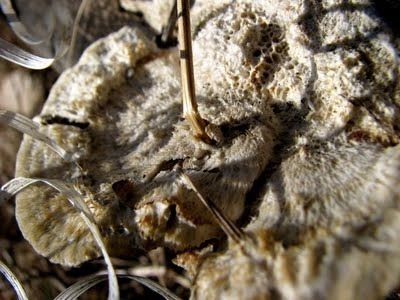Ariel Gordon's Blog, page 82
May 9, 2011
Hatchet! Throwing!
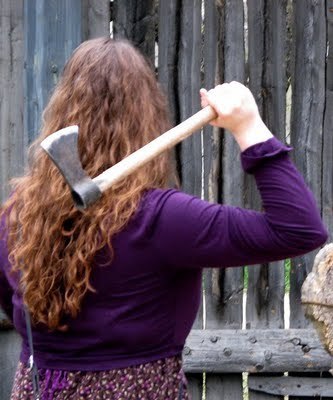
* * *
This is M's worst nightmare. Seriously. He doesn't even like it when I get my hands on the cardboard tubes from rolls of wrapping paper.
(The hatchet throwing took place at Prairie Fire's Speaking Volumes event at historic Fort Gibraltar.)
Published on May 09, 2011 11:28
May 8, 2011
How to Celebrate Mother's Day
"Warning #2. Don't bring up past issues. She may have been into drugs when you were a kid, and forgot you at school a lot, but don't talk about that today. Try to focus on the better times, when she supported one of your decisions, or when she did something silly and made everyone laugh." – How to Celebrate Mother's Day, wikiHow.
1.
Leave the house RIGHT now.
2.
In the name of home economics, efficiency, and Rorschach-like splatter, set off a small bomb in the kitchen at 8 am.
3.
Spray paint a loving tribute on a nearby bridge the night before. Go for a drive after dinner and see that the liquor made you write "I wuv you Momo."
You'll find that a brutal you-ee will stifle her contemptuous snorts.
4.
You've heard of vodka-infused watermelons? Get out the turkey baster and get…creative.
5.
Seriously. Don't come home until DARK.
6.
You've been giving your father Seven Eleven-grade plasticized porn and your mother bulk-bin peanut brittle for every major holiday since you were four...why stop now?
7.
Enlist your twitter minions to call your mother every minute the ENTIRE 24 hours of mother's day.
8.
Black roses.
* * *
After a muggy driving-around kind of day, I composed this poem for the May Day Poetry Project, which is in its seventh incarnation this year. (!)
I (mostly) apologize for the slightly morbid, porn-y aspects of the poem.
Published on May 08, 2011 20:13
Out-of-Town Authors: Annabel Lyon
GOLDEN opportunity
Fans can ask author their favourite Aristotelian questions
Winnipeg Free Press - PRINT EDITION
by: Ariel Gordon
Annabel Lyon is the New Westminster, B.C.-based author of four books.
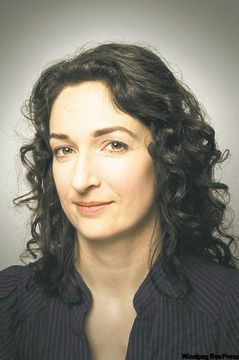 Her third book, a novel that plumbs the relationship between the philosopher Aristotle and his pupil Alexander the Great, won the 2009 Rogers Writers' Trust Fiction Prize - which is pretty good, but The Golden Mean (Random House) was also nominated for every other award for fiction a Canadian writer can be nominated for: The Giller.
Her third book, a novel that plumbs the relationship between the philosopher Aristotle and his pupil Alexander the Great, won the 2009 Rogers Writers' Trust Fiction Prize - which is pretty good, but The Golden Mean (Random House) was also nominated for every other award for fiction a Canadian writer can be nominated for: The Giller.
The Governor General's Award for Fiction.
The Commonwealth Writers Prize.
Annabel Lyon will be in Winnipeg on Monday, giving a combination reading/lecture at 7 p.m. in the University of Winnipeg's Eckhardt-Gramatté Hall.
1) As a writer (i.e. someone whose artistic practice is predicated on time spent alone) how do you approach performance? What do you get out of it?
For me, the best part of any reading is afterwards, when I get to meet people who've read my book and want to chat. I love hearing from readers. The best thing I hear from people who've read The Golden Mean is, "Now I want to read some Aristotle; where should I start?"
2) What do you want people to know about The Golden Mean?
I want people to know that even though it's about Aristotle, it's not dry or difficult: The ideas are very approachable (one of the things I love about the ancients) and I tried hard to give Aristotle a body as well as a mind. He eats, has sex, blows his nose, bleeds, laughs and so on. I tried to explore that part of him that's just a regular guy.
3) Will this be your first time in Winnipeg? What have you heard?
This is indeed my first time in Winnipeg. I've heard it has a great arts scene.
4) What are you reading right now? What are you writing right now?
I'm on the Scotiabank Giller Prize jury this year so I'm reading far more than I can possibly list.
I'm working on a sequel to The Golden Mean that will feature Aristotle's 16-year-old daughter, Pythias.
5) What were the biggest struggles for you of writing Aristotle's time and place?
I guess the biggest struggle was the endless research. You want your character to drink a glass of water; but what does that look like in ancient Macedon? Not a glass; is it a wooden cup, or pottery? Does the water come from a well? Would they keep jugs around the house? Would a slave fetch it, or would the character get it himself? It would have been easy to get bogged down in tiny details like that. I spent a lot of time trying to hang onto the bigger picture, to the contemporary resonance and relevance of the characters; what made them like us, rather than what made them different.
Ariel Gordon is a Winnipeg writer.
Fans can ask author their favourite Aristotelian questions
Winnipeg Free Press - PRINT EDITION
by: Ariel Gordon
Annabel Lyon is the New Westminster, B.C.-based author of four books.
 Her third book, a novel that plumbs the relationship between the philosopher Aristotle and his pupil Alexander the Great, won the 2009 Rogers Writers' Trust Fiction Prize - which is pretty good, but The Golden Mean (Random House) was also nominated for every other award for fiction a Canadian writer can be nominated for: The Giller.
Her third book, a novel that plumbs the relationship between the philosopher Aristotle and his pupil Alexander the Great, won the 2009 Rogers Writers' Trust Fiction Prize - which is pretty good, but The Golden Mean (Random House) was also nominated for every other award for fiction a Canadian writer can be nominated for: The Giller. The Governor General's Award for Fiction.
The Commonwealth Writers Prize.
Annabel Lyon will be in Winnipeg on Monday, giving a combination reading/lecture at 7 p.m. in the University of Winnipeg's Eckhardt-Gramatté Hall.
1) As a writer (i.e. someone whose artistic practice is predicated on time spent alone) how do you approach performance? What do you get out of it?
For me, the best part of any reading is afterwards, when I get to meet people who've read my book and want to chat. I love hearing from readers. The best thing I hear from people who've read The Golden Mean is, "Now I want to read some Aristotle; where should I start?"
2) What do you want people to know about The Golden Mean?
I want people to know that even though it's about Aristotle, it's not dry or difficult: The ideas are very approachable (one of the things I love about the ancients) and I tried hard to give Aristotle a body as well as a mind. He eats, has sex, blows his nose, bleeds, laughs and so on. I tried to explore that part of him that's just a regular guy.
3) Will this be your first time in Winnipeg? What have you heard?
This is indeed my first time in Winnipeg. I've heard it has a great arts scene.
4) What are you reading right now? What are you writing right now?
I'm on the Scotiabank Giller Prize jury this year so I'm reading far more than I can possibly list.
I'm working on a sequel to The Golden Mean that will feature Aristotle's 16-year-old daughter, Pythias.
5) What were the biggest struggles for you of writing Aristotle's time and place?
I guess the biggest struggle was the endless research. You want your character to drink a glass of water; but what does that look like in ancient Macedon? Not a glass; is it a wooden cup, or pottery? Does the water come from a well? Would they keep jugs around the house? Would a slave fetch it, or would the character get it himself? It would have been easy to get bogged down in tiny details like that. I spent a lot of time trying to hang onto the bigger picture, to the contemporary resonance and relevance of the characters; what made them like us, rather than what made them different.
Ariel Gordon is a Winnipeg writer.
Published on May 08, 2011 15:39
Out-of-Town-Authors: Annabel Lyon
GOLDEN opportunity
Fans can ask author their favourite Aristotelian questions
Winnipeg Free Press - PRINT EDITION
by: Ariel Gordon
Annabel Lyon is the New Westminster, B.C.-based author of four books.
 Her third book, a novel that plumbs the relationship between the philosopher Aristotle and his pupil Alexander the Great, won the 2009 Rogers Writers' Trust Fiction Prize - which is pretty good, but The Golden Mean (Random House) was also nominated for every other award for fiction a Canadian writer can be nominated for: The Giller.
Her third book, a novel that plumbs the relationship between the philosopher Aristotle and his pupil Alexander the Great, won the 2009 Rogers Writers' Trust Fiction Prize - which is pretty good, but The Golden Mean (Random House) was also nominated for every other award for fiction a Canadian writer can be nominated for: The Giller.
The Governor General's Award for Fiction.
The Commonwealth Writers Prize.
Annabel Lyon will be in Winnipeg on Monday, giving a combination reading/lecture at 7 p.m. in the University of Winnipeg's Eckhardt-Gramatté Hall.
1) As a writer (i.e. someone whose artistic practice is predicated on time spent alone) how do you approach performance? What do you get out of it?
For me, the best part of any reading is afterwards, when I get to meet people who've read my book and want to chat. I love hearing from readers. The best thing I hear from people who've read The Golden Mean is, "Now I want to read some Aristotle; where should I start?"
2) What do you want people to know about The Golden Mean?
I want people to know that even though it's about Aristotle, it's not dry or difficult: The ideas are very approachable (one of the things I love about the ancients) and I tried hard to give Aristotle a body as well as a mind. He eats, has sex, blows his nose, bleeds, laughs and so on. I tried to explore that part of him that's just a regular guy.
3) Will this be your first time in Winnipeg? What have you heard?
This is indeed my first time in Winnipeg. I've heard it has a great arts scene.
4) What are you reading right now? What are you writing right now?
I'm on the Scotiabank Giller Prize jury this year so I'm reading far more than I can possibly list.
I'm working on a sequel to The Golden Mean that will feature Aristotle's 16-year-old daughter, Pythias.
5) What were the biggest struggles for you of writing Aristotle's time and place?
I guess the biggest struggle was the endless research. You want your character to drink a glass of water; but what does that look like in ancient Macedon? Not a glass; is it a wooden cup, or pottery? Does the water come from a well? Would they keep jugs around the house? Would a slave fetch it, or would the character get it himself? It would have been easy to get bogged down in tiny details like that. I spent a lot of time trying to hang onto the bigger picture, to the contemporary resonance and relevance of the characters; what made them like us, rather than what made them different.
Ariel Gordon is a Winnipeg writer.
Fans can ask author their favourite Aristotelian questions
Winnipeg Free Press - PRINT EDITION
by: Ariel Gordon
Annabel Lyon is the New Westminster, B.C.-based author of four books.
 Her third book, a novel that plumbs the relationship between the philosopher Aristotle and his pupil Alexander the Great, won the 2009 Rogers Writers' Trust Fiction Prize - which is pretty good, but The Golden Mean (Random House) was also nominated for every other award for fiction a Canadian writer can be nominated for: The Giller.
Her third book, a novel that plumbs the relationship between the philosopher Aristotle and his pupil Alexander the Great, won the 2009 Rogers Writers' Trust Fiction Prize - which is pretty good, but The Golden Mean (Random House) was also nominated for every other award for fiction a Canadian writer can be nominated for: The Giller. The Governor General's Award for Fiction.
The Commonwealth Writers Prize.
Annabel Lyon will be in Winnipeg on Monday, giving a combination reading/lecture at 7 p.m. in the University of Winnipeg's Eckhardt-Gramatté Hall.
1) As a writer (i.e. someone whose artistic practice is predicated on time spent alone) how do you approach performance? What do you get out of it?
For me, the best part of any reading is afterwards, when I get to meet people who've read my book and want to chat. I love hearing from readers. The best thing I hear from people who've read The Golden Mean is, "Now I want to read some Aristotle; where should I start?"
2) What do you want people to know about The Golden Mean?
I want people to know that even though it's about Aristotle, it's not dry or difficult: The ideas are very approachable (one of the things I love about the ancients) and I tried hard to give Aristotle a body as well as a mind. He eats, has sex, blows his nose, bleeds, laughs and so on. I tried to explore that part of him that's just a regular guy.
3) Will this be your first time in Winnipeg? What have you heard?
This is indeed my first time in Winnipeg. I've heard it has a great arts scene.
4) What are you reading right now? What are you writing right now?
I'm on the Scotiabank Giller Prize jury this year so I'm reading far more than I can possibly list.
I'm working on a sequel to The Golden Mean that will feature Aristotle's 16-year-old daughter, Pythias.
5) What were the biggest struggles for you of writing Aristotle's time and place?
I guess the biggest struggle was the endless research. You want your character to drink a glass of water; but what does that look like in ancient Macedon? Not a glass; is it a wooden cup, or pottery? Does the water come from a well? Would they keep jugs around the house? Would a slave fetch it, or would the character get it himself? It would have been easy to get bogged down in tiny details like that. I spent a lot of time trying to hang onto the bigger picture, to the contemporary resonance and relevance of the characters; what made them like us, rather than what made them different.
Ariel Gordon is a Winnipeg writer.
Published on May 08, 2011 15:39
May 7, 2011
Thien strong enough to let ambiguity stand
Winnipeg Free Press - PRINT EDITION
Reviewed by: Ariel Gordon
Dogs at the Perimeter
By Madeleine Thien
McClelland & Stewart, 256 pages, $30
MONTREAL-BASED Madeleine Thien's second novel is a fractured and fragmented story that inhabits both 1970s Cambodia and modern-day Montreal.
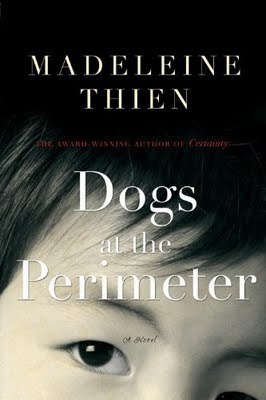 Thien's debut novel, 2006's Certainty, was about integration, her characters dealing with grieving and loss at a safe remove.
Thien's debut novel, 2006's Certainty, was about integration, her characters dealing with grieving and loss at a safe remove.
In Dogs at the Perimeter, however, Thien locates her main character - and so also her readers - mid-mental breakdown.
Janie is the only member of her family to survive the Khmer Rouge's reign in her native Cambodia. After she escapes to Malaysia, Janie is adopted by a Vancouver scientist and also becomes a scientist.
Eventually making her way to Montreal, Janie works under Japanese-Canadian neurologist Hiroji Matsui.
Matsui's research focuses on how memory and personality are tied to brain function and how those aspects of who we are can change after an injury to or disease of the brain.
But Janie and Hiroji have something besides work in common: Hiroji's brother Junichiro, a Red Cross doctor working in Cambodia, went missing during the Khmer Rouge period.
(Sound convoluted? It wouldn't be a Madeleine Thien novel if it weren't.)
Hiroji functions as a prop for the orphaned and disjointed Janie, has allowed her to find a career and an address, a husband and a child.
Janie has never reconciled all the pieces of her identity, all the times and places she's lived in and lived through.
But Hiroji is just as disjointed, dividing his adult life into two categories: when he is actively looking for his brother and when he is not.
Neither mode is satisfying and so, as the book opens, he abandons his entire North American existence: job, house, pet.
His disappearance triggers Janie's breakdown. As she reels, leaving her husband and child, working long hours on little sleep, we learn that Janie is her third name.
Before that, she was Mei, a name given to her in the Khmer Rouge camps as a part of their attempts at social engineering. Before that? We don't know: either Janie has forgotten or she needs to keep it private.
Janie learns that naming and numbering what happened to her, what happened to Hiroji and Junichiro and her own lost brother Sopham, is enough to keep her sane.
And this is the difference between Thien's novel and such recent Vietnam War-themed novels as Johanna Skibsrud's The Sentimentalists and David Bergen's The Time in Between. Janie is not the child of trauma, guessing at the motivations of a damaged (and somewhat complicit) parent.
The damage here is raw and immediate, even if Janie is revisiting it from a remove of 30 years.
Furthermore, Janie was a child and a non-combatant: she grew up into the trauma, unlike the foreign soldiers of Bergen's and Skibsrud's books.
Which is not to say that Thien, whose parents immigrated to Canada from Malaysia, doesn't allow her characters ambiguity: Janie, for instance, badly scares her young son during her breakdown.
Those stunning scenes, where Janie is only fleetingly sane, recalls the moment in Sandra Birdsell's The Chrome Suite (1992) where the main character realizes that she cannot keep herself from hurting her child.
Here and in Certainty, Thien's broken characters are lucky: they have spouses and extended families that are gently forgiving of the dark behaviours damage can elicit.
Thien conveys the sense that both Janie and Hiroji might be able to cobble together enough of the pieces of themselves to stay sane.
But they might not. And Thien is a brave and strong enough writer to let that final ambiguity stand.
Winnipeg writer Ariel Gordon won this year's Aqua Books Lansdowne Prize for Poetry at the Manitoba Book Awards.
Reviewed by: Ariel Gordon
Dogs at the Perimeter
By Madeleine Thien
McClelland & Stewart, 256 pages, $30
MONTREAL-BASED Madeleine Thien's second novel is a fractured and fragmented story that inhabits both 1970s Cambodia and modern-day Montreal.
 Thien's debut novel, 2006's Certainty, was about integration, her characters dealing with grieving and loss at a safe remove.
Thien's debut novel, 2006's Certainty, was about integration, her characters dealing with grieving and loss at a safe remove.In Dogs at the Perimeter, however, Thien locates her main character - and so also her readers - mid-mental breakdown.
Janie is the only member of her family to survive the Khmer Rouge's reign in her native Cambodia. After she escapes to Malaysia, Janie is adopted by a Vancouver scientist and also becomes a scientist.
Eventually making her way to Montreal, Janie works under Japanese-Canadian neurologist Hiroji Matsui.
Matsui's research focuses on how memory and personality are tied to brain function and how those aspects of who we are can change after an injury to or disease of the brain.
But Janie and Hiroji have something besides work in common: Hiroji's brother Junichiro, a Red Cross doctor working in Cambodia, went missing during the Khmer Rouge period.
(Sound convoluted? It wouldn't be a Madeleine Thien novel if it weren't.)
Hiroji functions as a prop for the orphaned and disjointed Janie, has allowed her to find a career and an address, a husband and a child.
Janie has never reconciled all the pieces of her identity, all the times and places she's lived in and lived through.
But Hiroji is just as disjointed, dividing his adult life into two categories: when he is actively looking for his brother and when he is not.
Neither mode is satisfying and so, as the book opens, he abandons his entire North American existence: job, house, pet.
His disappearance triggers Janie's breakdown. As she reels, leaving her husband and child, working long hours on little sleep, we learn that Janie is her third name.
Before that, she was Mei, a name given to her in the Khmer Rouge camps as a part of their attempts at social engineering. Before that? We don't know: either Janie has forgotten or she needs to keep it private.
Janie learns that naming and numbering what happened to her, what happened to Hiroji and Junichiro and her own lost brother Sopham, is enough to keep her sane.
And this is the difference between Thien's novel and such recent Vietnam War-themed novels as Johanna Skibsrud's The Sentimentalists and David Bergen's The Time in Between. Janie is not the child of trauma, guessing at the motivations of a damaged (and somewhat complicit) parent.
The damage here is raw and immediate, even if Janie is revisiting it from a remove of 30 years.
Furthermore, Janie was a child and a non-combatant: she grew up into the trauma, unlike the foreign soldiers of Bergen's and Skibsrud's books.
Which is not to say that Thien, whose parents immigrated to Canada from Malaysia, doesn't allow her characters ambiguity: Janie, for instance, badly scares her young son during her breakdown.
Those stunning scenes, where Janie is only fleetingly sane, recalls the moment in Sandra Birdsell's The Chrome Suite (1992) where the main character realizes that she cannot keep herself from hurting her child.
Here and in Certainty, Thien's broken characters are lucky: they have spouses and extended families that are gently forgiving of the dark behaviours damage can elicit.
Thien conveys the sense that both Janie and Hiroji might be able to cobble together enough of the pieces of themselves to stay sane.
But they might not. And Thien is a brave and strong enough writer to let that final ambiguity stand.
Winnipeg writer Ariel Gordon won this year's Aqua Books Lansdowne Prize for Poetry at the Manitoba Book Awards.
Published on May 07, 2011 20:55
May 4, 2011
Happy goddamn birthday!
So I launched Hump a year ago today.
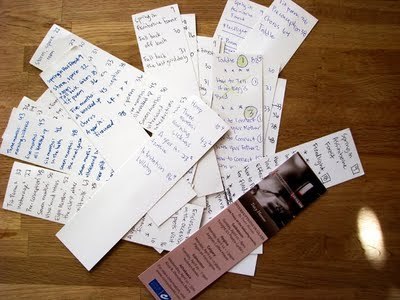 And I'm convinced that the reason that THAT reading went well - and that the 18 other readings I did from this book this year mostly went well - was because of my "system."
And I'm convinced that the reason that THAT reading went well - and that the 18 other readings I did from this book this year mostly went well - was because of my "system."
Which mostly involves a stack of bookmarks for Tracy Hamon's Interruptions in Glass, advertising the tour we went on last spring...and a quiet half-hour before each reading.
I would find somewhere quiet to sit for a half-hour and think about the reading that night: who the audience would be, how long I was slated to read for...and which poems I had a hankering to read.
And I would write the names of the poems I wanted to read and their page number and sometimes even how many pages for each poem on the back of the bookmark. And then I tucked it in the book.
Somehow, knowing that I had Tracy close to me helped. Knowing I had a plan, even if I deviated from the plan during the reading itself, helped.
So it became my little superstition.
I kept all the bookmarks in a drawer of my desk, the blank ones and the used ones. And it has been very satisfying, over the course of this year, to see them accumulate.
(I still have an impressive stack of blank ones, though I imagine that I will be doing fewer readings now that Hump is sort of...long in the tooth.)
Thanks to everyone who supported me this year. And thanks, specifically, to Tracy. And to Coteau, for providing me with the means for my strange little ritual.
 And I'm convinced that the reason that THAT reading went well - and that the 18 other readings I did from this book this year mostly went well - was because of my "system."
And I'm convinced that the reason that THAT reading went well - and that the 18 other readings I did from this book this year mostly went well - was because of my "system."Which mostly involves a stack of bookmarks for Tracy Hamon's Interruptions in Glass, advertising the tour we went on last spring...and a quiet half-hour before each reading.
I would find somewhere quiet to sit for a half-hour and think about the reading that night: who the audience would be, how long I was slated to read for...and which poems I had a hankering to read.
And I would write the names of the poems I wanted to read and their page number and sometimes even how many pages for each poem on the back of the bookmark. And then I tucked it in the book.
Somehow, knowing that I had Tracy close to me helped. Knowing I had a plan, even if I deviated from the plan during the reading itself, helped.
So it became my little superstition.
I kept all the bookmarks in a drawer of my desk, the blank ones and the used ones. And it has been very satisfying, over the course of this year, to see them accumulate.
(I still have an impressive stack of blank ones, though I imagine that I will be doing fewer readings now that Hump is sort of...long in the tooth.)
Thanks to everyone who supported me this year. And thanks, specifically, to Tracy. And to Coteau, for providing me with the means for my strange little ritual.
Published on May 04, 2011 07:07
May 3, 2011
April 28, 2011
NPM blog!
Dennis Cooley, rob mclennan, Linda Crosfield, Heather Cadsby, Fern G.Z. Carr, Alice Major, Mary Angela Nangini, Carol Little, Carol Rose, Stevens Taeho Han, Susan McMaster, Carmelo Militano, Rebecca Leah Păpucaru, Gillian Harding-Russell, Kelly-Anne Riess, Joe Blades, Bruce Rice, Bernadette Wagner, Penn Kemp, Rebecca Anne Banks, Peggy Fletcher, John Oughton, Jennifer Boire, Heidi Greco, Susan McCaslin, Claudia Coutu Radmore, Rosalee van Stelten, Fiona Lam, Marvyne Jenoff, Karen P. Ouellette, Rhea Tregebov, Leanne Boschman, John Brook, Peter McEwen, Melanie Marttila, Cornelia Hoogland, Madhur Anand, Anne Szumigalski, Flavia Cosma, Alison Clarke, Dina E. Cox, Tracy Hamon, Debbie Okun Hill, Ellen S. Jaffe, Colin Morton, Honey Novik, Terry Anne Carter, Janet Vickers, Audrey Ogilvie, Lori Cayer, D.C. Reid, Kath McLean, Sarah Klassen, Christine Smart, Ann Elizabeth Carson, Maurice Mierau, Patricia Anne McGoldrick, Susan Musgrave, Roger Moore, Alisa Gordaneer, Katerina Fretwell, Vivian Demuth, Carol A. Stephen, David Fraser, Lorraine Gane, Elizabeth Woods, Ron Charach, Kate Marshall Flaherty, April Bulmer, Leanne McIntosh, Pearl Pirie, Marilyn Boyle, M.E. Csamer, Bren Simmers, John B. Lee, Kim Goldberg, Steven Ross Smith, Dorothy Mohoney, Anne Swannell…
…and me, today on the National Poetry Month blog.
I chose to share the poem "A year in: fireweed" from Hump, because it's sort of nurture-y. Which is the theme for this year's edition of the blog.
There's still more NPM poetry to come. Two more days of poetry, to be precise.
…and me, today on the National Poetry Month blog.
I chose to share the poem "A year in: fireweed" from Hump, because it's sort of nurture-y. Which is the theme for this year's edition of the blog.
There's still more NPM poetry to come. Two more days of poetry, to be precise.
Published on April 28, 2011 19:09
April 26, 2011
NPM reading #2
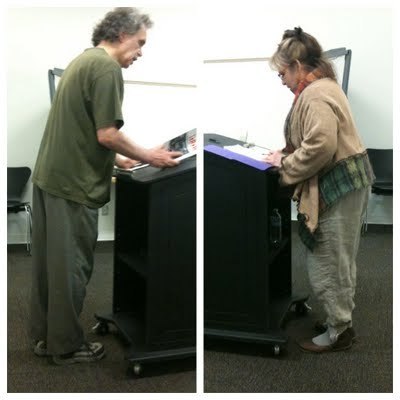
Colin Smith & Deborah Schnitzer at the Millennium Library April 26.
* * *
Today's reading was great fun in that it consisted of four readings by two poets & four books of poetry given away for good guesses of my inane poetry quizzes.
Thanks to everyone laughed and sighed away their lunch hour today & two Tuesdays ago.
Thanks too to the League of Canadian Poets for the funding for this reading and for National Poetry Month just generally...
(For more NPM goodness, see the NPM blog: lcpnationalpoetrymonth2011.wordpress.com.)
Published on April 26, 2011 12:42

